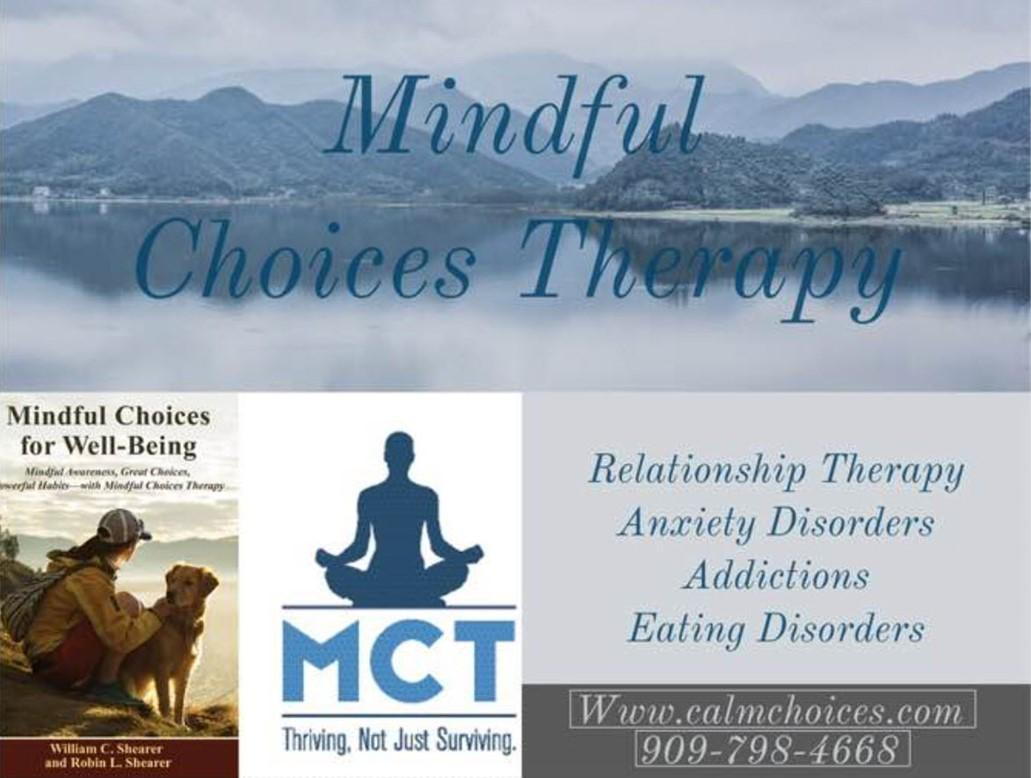
The Mindful Choices Therapy approach to coping
with panic attacks and anxiety disorders
Many of our clients suffer from extreme anxiety and/or panic. It's not at all unusual to see first time clients having multiple panic attacks daily. They come for their first appointment in great distress, desperate to find relief from their panicky feelings. While much of the focus is on corrective self-talk and helping our clients recognize negative thoughts as only thoughts, there are also positive thoughts and beliefs that we would like them to embrace.
People who experience panicky feelings and panic attacks dramatically illustrate the power of your thoughts to make you intensely uncomfortable. For panic disorder clients in particular, there are eight major positive beliefs they need to completely adopt. In fact, holding these beliefs without reservation would effectively negate the kind of thinking that gives rise to panic attacks. These beliefs were developed by Bill after his recovery from panic disorder in the early 1970s.
Please note that these beliefs, although designed to be used with panic disorder, also have great relevance for stress and anxiety in general.
New clients are often asked to rate their confidence in these beliefs scale from 1 to 10. Early on, scores are quite low. With subsequent sessions, scores rise and there is a corresponding rise in the ability to cope with panicky feelings and panic attacks.
Eight things you have to believe completely to overcome your panic disorder:
1. It's only anxiety. Panic attacks are terrifying. When our clients think scary thoughts, their bodies react with a wide range of physical sensations so intensely uncomfortable, they are sure something is terribly wrong and their very survival is at stake. It's absolutely important that clients come to believe that their experience is understandable and nothing more than a normal physiological response to perceived danger –it's only anxiety!
2. It can't hurt you. Panicky feelings may involve a whole range of sensations such as rapid heart rate, sweating, difficulty breathing, and feelings of unreality. The sensations are so unsettling that it's quite easy to jump to the conclusion that you're about to have a heart attack, die, or have something absolutely terrible happen. However, the panic itself can't hurt you; it just feels terrible.
3. You can handle it. This belief is a natural progression from the previous belief. If it can't hurt you, then you can handle it. In the case of people who have had previous panic attacks, we point out that they have always gotten through them, and have never been physically harmed. Yes, it feels terrible, but you will handle it and get through it. You always have and you always will.
4. It will pass quickly enough if you let it. Panic attacks are time limited. We are talking about a short-term physiological reaction. That surge of adrenaline will quickly dissipate. However, if you struggle against it and allow yourself to become panicky about being panicky, the reaction can be perpetuated. On the other hand, if you can simply breathe from your diaphragm, think peaceful thoughts, and allow it to pass – it will quickly pass.
5. You can develop all the tools you need. The good news about anxiety disorders is that they are the most treatable of all psychological problems once people get a correct diagnosis and begin working within a program where anxiety disorders are understood. The tools exist, and people typically get much better once they begin working on their anxiety in ways that make sense.
6. You don't have to worry about it in advance. This "anticipatory anxiety," fearing that another attack is imminent is what brings on the next attack. People would be much better off if they could say to themselves: "If it happens, it happens. I don't have to worry about it in advance. If it happens, I'll handle it." If this belief: "You don't have to worry about it in advance" is given a 10 on our 10 point scale, it would be extremely unusual to have a panic attack.
7. You will manage your anxiety not by conquering it, but by accepting it. It’s like being stuck in quicksand; the more you struggle the more you are stuck. It’s paradoxical. Slow down and accept your anxiety and you can begin to work effectively with it.
8. Thoughts are just thoughts and while you don’t have much control over the thoughts that pop into your head, you can have complete control over how you react to them. This is the main point of Acceptance and Commitment Therapy. You can simply notice the thoughts and decide whether or not they are useful or workable. If not useful, you can move on in the direction of values-based choices.
www.CalmChoices.com [email protected]
William Carey Shearer Ph. D., Ed. D., M.B.A., M.P.H., M.A. Licensed Psychologist PSY 5077
Robin L. Shearer M.A., M.P.H., R.N., M.F.T. Marriage and Family Therapist MFC 37291